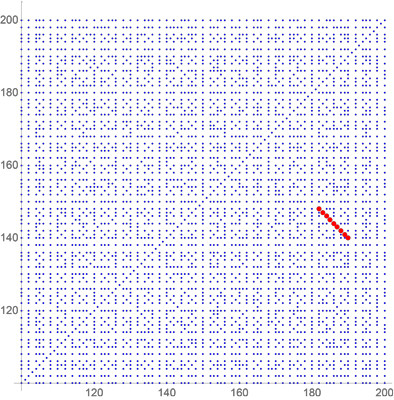I've decided to take some research off the back burner and share it here, as it addresses a slight generalization of Joseph's question.
Rephrasing Seva's answer , take as many distinct primes $p_i$ as you wish, call their product $a+b$, and solve for $a$ using the congruences $a+i \equiv 0 \mod p_i$. If you want the same size $a+b$, but a longer interval, you need to replace $a+i$ with $a+h(i)$, where some effort has been exerted to find these offsets $h(i)$. (See Hagedorn's 2009 paper and later for more; he uses $h(n)$ to mean something different.) The effort is related to Jacobsthal's function , on which I posted a question in 2010 (cf MathOverflow 37679).
What if you wanted to find many of these diagonals with the same value for $a+b$? A quick way is to permute the $i$'s: if there are $k$ primes, there may be up to $k!$ many choices for $a$. However, inverting a system of congruences a factorial number of times is tedious. Is there a better way?
I spent some time in 2014 thinking of a better way, and found this interesting bit. Let the $k$ distinct primes all be greater than $k$. If $k$ is odd, there is a correspondence between these $k!$ intervals and additive permutations, so that some pairs of the intervals add to give other intervals. As an example, 98,99,100 and 20,21,22 add to give 119,120,121 for $k=3$. Further, this implies that some of these intervals are "far away" from the $x=y$ diagonal.
More interesting is the fact that this breaks horribly for even $k$. Not only is there no such nice additive relation between any of the intervals, but some numbers $n$ seem to have all their $k!$ many intervals grouped near the main diagonal, as opposed to having them spread far apart as in the odd $k$ situation. I will spend some time this coming year thinking about these narrow numbers $n$, and I now invite others to do so and share their thoughts.
Gerhard "Can Be Narrow And Sharing" Paseman, 2016.12.26.

